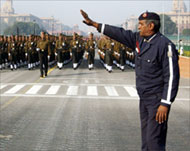Blasts cloud India’s Republic Day
Maoist rebels in eastern India have blown up a rail bridge and attacked a police station hours before the country was to begin its annual Republic Day celebrations.

The attack came as New Delhi was gearing up to host Saudi Arabia’s king at the day’s main military parade – the first visit by a Saudi royal for 51 years.
The rebels blew up the bridge over a small river near Gaya, 100km (60 miles) from Patna, capital of Bihar state around midnight on Wednesday, police said.
They said a dozen trains, including three long-distance super-fast Rajdhani trains, were stopped at various points as the tracks were smashed. The bridge was on one of the main rail links to east and northeastern India.
Prior to the blast, armed rebels stormed a small station at Rafiganj, and asked the railway staff to leave the building before they planted at least two bombs on the tracks.
Security
Thousands of police, paramilitary and army soldiers have been deployed to prevent attacks, amid calls for a boycott of the celebrations from insurgent groups that do not accept Indian sovereignty – including Muslim separatists in Kashmir, ethnic
militant groups in the remote northeast, and communist guerrillas in several states in the east and south.
 |
|
Thousands of police officers will |
India became a republic on 26 January 1950, three years after British rule left the Indian subcontinent after two centuries of colonial rule. India celebrates the day with military parades in all major cities.
The main parade in New Delhi, watched by thousands, will include Brahmos supersonic cruise missiles, two versions of the nuclear-capable Agni missile, Prithvi surface-to-surface missiles, tanks, artillery guns and other sophisticated military hardware, a defence ministry statement said. Fighter aircraft will conduct aerial manoeuvres.
The Saudi king’s presence underscores the growing political ties between two countries that spent nearly a half-century on opposite sides of the Cold War divide.
For Saudi Arabia, King Abdullah’s visit to India offers his country a chance to foster ties with an emerging power, and in the process reduce the kingdom’s dependence on the West, especially the US.
Further incidents
In another late-night incident, Maoist rebels surrounded a police station in Palamu district in Jharkhand, a state neighbouring Bihar, and opened indiscriminate fire.
There were no immediate reports of casualties. Maoist rebels, who claim to be waging a war for the rights of the poor and downtrodden, have pockets of influence in Bihar, Jharkhand and some southern states.